|
Upcoming Events
Aquaculture Clinic
9–11 December 2011
WorldFish Center
Utrecht, The Netherlands
 The WorldFish Center and A-Spark Good Ventures are co-organising an inaugural Aquaculture Clinic on 9–11 December 2011 in Utrecht, the Netherlands, to initiate a global sustainable impact investment fund on aquaculture. The WorldFish Center and A-Spark Good Ventures are co-organising an inaugural Aquaculture Clinic on 9–11 December 2011 in Utrecht, the Netherlands, to initiate a global sustainable impact investment fund on aquaculture.
There is growing global awareness of the need for a sustainable supply of seafood. The stresses on wild capture fisheries from pollution, over-fishing and habitat destruction are now well- recognised. While fishermen worldwide have to cope with diminished catches, consumers are faced with rising food prices. The problem is complex, growing and needs prompt action.
Aquaculture is one of the fastest growing food production sectors in the world, growing at an average annual rate of 8.4 per cent since 1970 and reaching a total production of 65.8 million tons in 2008. Recently, aquaculture has started to attract the attention of impact investors, as it has the potential to be a sustainable solution to food shortages in the years to come.
The event will allow participants to learn about aquaculture and the attendant opportunities and risks, best practices and learning points in order to come up with a way to combine conservation, poverty alleviation, increased income stability and food security in a socially, environmentally and economically sustainable fund.
Click here to register for the event.
^ To the top
Announcements
CGIAR Research Program on Aquatic Agricultural Systems – Oversight Panel Announced
 The WorldFish Center’s Board of Trustees is pleased to announce the selection of the independent members of the inaugural Program Oversight Panel for the CGIAR Research Program on Aquatic Agricultural Systems. They are namely Jo Luck (Chair), Chris Barlow, John Kurien, Kyoko Kusakabe, John Lynam and Rekha Mehra. These six members join Stephen Hall (WorldFish representative) and Barbara Schreiner (CGIAR Center representative) in providing strategic oversight and monitoring for the programme, together with guidance on science quality, gender, partnerships and networking. In selecting the panel, the Board paid particular attention to candidates who contribute strongly to these key areas. The WorldFish Center’s Board of Trustees is pleased to announce the selection of the independent members of the inaugural Program Oversight Panel for the CGIAR Research Program on Aquatic Agricultural Systems. They are namely Jo Luck (Chair), Chris Barlow, John Kurien, Kyoko Kusakabe, John Lynam and Rekha Mehra. These six members join Stephen Hall (WorldFish representative) and Barbara Schreiner (CGIAR Center representative) in providing strategic oversight and monitoring for the programme, together with guidance on science quality, gender, partnerships and networking. In selecting the panel, the Board paid particular attention to candidates who contribute strongly to these key areas.
Click here to access the biographies of panel members. |
^ To the top
Recent Events
9th Annual Conflict Transformation Workshop
1–4 December 2011
Women in Security, Conflict Management and Peace (WISCOMP)
New Delhi, India
 The 9th Annual Conflict Transformation Workshop on Gender, Democracy and Peacebuilding in South Asia that was held from 1–4 December 2011 in New Delhi, brought together a group of 40 youth leaders from Afghanistan, Bangladesh, India, Nepal, Pakistan, Sri Lanka and Tibet for a dialogue-cum-training session in conflict transformation. The 9th Annual Conflict Transformation Workshop on Gender, Democracy and Peacebuilding in South Asia that was held from 1–4 December 2011 in New Delhi, brought together a group of 40 youth leaders from Afghanistan, Bangladesh, India, Nepal, Pakistan, Sri Lanka and Tibet for a dialogue-cum-training session in conflict transformation.
The event sought to build trust and strategic relationships between young South Asians from diverse cultural, linguistic, ethnic and religious backgrounds; enhance professional development in the areas of gender, non-violence and conflict transformation; and promote cross-border peace partnerships and empathy for diverse worldviews. Since 2001, these conflict transformation workshops have brought together youth leaders (in the 22–35 age group) from India and Pakistan with the purpose of broadening the network of ‘future influentials’, and providing them with the skills and expertise to participate in processes of peace and conflict transformation. This year, the goals of the workshop had been broadened to include young professionals from other countries of the South Asian Association for Regional Cooperation (SAARC) region (in addition to India and Pakistan).
Several eminent scholars that spoke at the workshop included Amb. Terhi Hakala (Ambassador of Finland to India); Prof. Irene Santiago (Chair and Chief Executive Officer, Mindanao Commission on Women); Amb. Veena Sikri (Former Ambassador and Convener, South Asia Women’s Network); Prof. Peter Ronald deSouza (Director, Indian Institute of Advanced Study); Ms Bandana Rana (Executive Chair, Saathi, Nepal); Prof. Pratap Bhanu Mehta (Director, Centre for Policy Research); Prof. Vinay Lal (Professor, Delhi University); Prof. Anuradha Chenoy (Professor, Jawaharlal Nehru University); and Dr Mallika Joseph (Director, Institute for Peace and Conflict Studies).
Conference on
‘The Evolution of International Security Studies and Non-Traditional Security Studies in China’
Center for Non-traditional Security and Peaceful Development Studies (NTS-PD)
29 November 2011
China
A conference on ‘The Evolution of International Security Studies and Non-Traditional Security Studies in China’ was held on 29 November 2011. The conference was jointly organised by NTS-PD, Zhejiang University, and the Journal of International Political Studies, Peking University. Prof. Yu Xiaofeng, Director of NTS-PD, and research fellows Shunji Cui, Junxian Gan and Danzi Liao participated in the conference.
BIPSS Roundtable on ‘Civil-Military Relations in Bangladesh’
Bangladesh Institute of Peace and Security Studies (BIPSS)
21 November 2011
Dhaka, Bangladesh
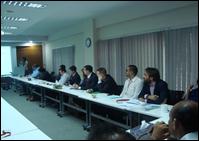
BIPSS successfully held a Roundtable on ‘Civil-military Relations in Bangladesh: Challenges and Opportunities’ on 21 November 2011, at German House, Dhaka. Kristin Bleyder, Member of the Heidelberg Institute for International Conflict Research, delivered the keynote presentation on the theme. The roundtable was presided over by BIPSS President Major-General Muniruzzaman (Retd).
1st Munich Security Conference Meeting
Center for Non-traditional Security and Peaceful Development Studies (NTS-PD)
20–21 November 2011
Beijing, China
 Director of NTS-PD, Prof. Yu Xiaofeng, attended the 1st Munich Security Conference Meeting (MSC) in Beijing to discuss the growing role of China, India and other Asian nations in world politics. The theme of this year’s conference was ‘China and Cross-Atlantic Nations: Global Security Governance’, and it was attended by former North Atlantic Treaty Organization (NATO) Secretary-General and High Representative of the European Union (EU) for Foreign Affairs and Security Policy, Mr Javier Solana; Chairman of the Foreign Affairs Committee of the German Bundestag, Mr Ruprecht Polenz; State Secretary at the Federal Foreign Office, Ms Emily Haber; Parliamentary State Secretary at the Federal Ministry of Defense, Mr Christian Schmidt; First Deputy Foreign Minister of the Russian Federation, Mr Andrey Denisov; financier Mr George Soros; Barclays Capital Vice Chairman Sir David Wright, and Mr Jay Ralph, CEO of Allianz Asset Management. There were about 40 participants comprising senior officials, military officers, parliament members, tank tank representatives and economists from North America, Europe and China present at this meeting. Director of NTS-PD, Prof. Yu Xiaofeng, attended the 1st Munich Security Conference Meeting (MSC) in Beijing to discuss the growing role of China, India and other Asian nations in world politics. The theme of this year’s conference was ‘China and Cross-Atlantic Nations: Global Security Governance’, and it was attended by former North Atlantic Treaty Organization (NATO) Secretary-General and High Representative of the European Union (EU) for Foreign Affairs and Security Policy, Mr Javier Solana; Chairman of the Foreign Affairs Committee of the German Bundestag, Mr Ruprecht Polenz; State Secretary at the Federal Foreign Office, Ms Emily Haber; Parliamentary State Secretary at the Federal Ministry of Defense, Mr Christian Schmidt; First Deputy Foreign Minister of the Russian Federation, Mr Andrey Denisov; financier Mr George Soros; Barclays Capital Vice Chairman Sir David Wright, and Mr Jay Ralph, CEO of Allianz Asset Management. There were about 40 participants comprising senior officials, military officers, parliament members, tank tank representatives and economists from North America, Europe and China present at this meeting.
To find out more about the MSC, click here.
Launch of the COSATT Recommendations on ‘Energy and Environment Security:
A Cooperative Approach’
Regional Centre for Strategic Studies (RCSS)
11 November 2011
Kandy, Sri Lanka
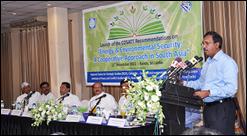 |
| Hon. Anura Priyadharshana Yapa, Minister of Environment of Sri Lanka, giving the keynote address. |
The Consortium of South Asian Think Tanks (COSATT) Recommendations on ‘Energy and Environment Security in South Asia: A Cooperative Approach in South Asia’ was launched in Kandy, Sri Lanka on 11 November 2011 as part of the regional launch in South Asia. The keynote address of the event was delivered by Sri Lanka’s Minister of Environment, Hon. Anura Priyadharshana Yapa. Both the recommendations booklet and the book was presented to the Minister of Environment as well as other invitees. The book launch in Sri Lanka was co-organised by the Central Environmental Authority (CEA) of Sri Lanka and RCSS. The project on ‘Energy and Environment Security in South Asia: A Cooperative Approach’ is an annual project of COSATT, convened by the Institute of Peace and Conflict Studies (IPCS) of New Delhi with the collaboration of the SAARC Regional Programme of the Konrad-Adenauer-Stiftung (KAS) based in New Delhi.
Focus Group Discussion on ‘Youth in Indian Politics’
Centre for the Study of Developing Societies (CSDS)
22 October 2011
Delhi, India
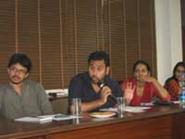 As part of the study ‘Youth in Indian Politics’, a Focus Group Discussion (FGD) with student leaders of the University of Delhi, was organised on 22 October 2011 at CSDS. Student leaders from all the important student wings of different political parties participated in the discussion and shared their views on youth involvement in politics. Those who participated in the discussion included two former Delhi University Students Union (DUSU) presidents, Ms Ragini Nayak and Mr Rohit Chowdhary; they were also from the Congress-supported National Students Union of India (NSUI). The two student leaders who participated in the discussion from the Bharatiya Janata Party-supported Akhil Bhartiya Vidharthi Parishad (ABVP) included Ms Priya Dabas, former DUSU Vice President; and Ms Neetu Dabas, the former DUSU Secretary. The students who represented the left-supported Students Federation of India (SFI) were Mr Sunand, Mr Atul Chandra and Ms Ritu Priya. They had contested the DUSU election for various posts and have been active in student politics. A few other students active in student politics also participated in the discussion. As part of the study ‘Youth in Indian Politics’, a Focus Group Discussion (FGD) with student leaders of the University of Delhi, was organised on 22 October 2011 at CSDS. Student leaders from all the important student wings of different political parties participated in the discussion and shared their views on youth involvement in politics. Those who participated in the discussion included two former Delhi University Students Union (DUSU) presidents, Ms Ragini Nayak and Mr Rohit Chowdhary; they were also from the Congress-supported National Students Union of India (NSUI). The two student leaders who participated in the discussion from the Bharatiya Janata Party-supported Akhil Bhartiya Vidharthi Parishad (ABVP) included Ms Priya Dabas, former DUSU Vice President; and Ms Neetu Dabas, the former DUSU Secretary. The students who represented the left-supported Students Federation of India (SFI) were Mr Sunand, Mr Atul Chandra and Ms Ritu Priya. They had contested the DUSU election for various posts and have been active in student politics. A few other students active in student politics also participated in the discussion.
The FGD which was one of four such discussions was meant to gather views of student leaders on the participation of youth in Indian politics. The views shared by different student leaders would be used as input to the project report being prepared about the study on 'Youth in Indian Politics'. The report will be launched on 27 February 2012.
Click here to read the November edition of the Lokniti Newsletter.
4th Cross-Straits Energy Economics Conference
21–23 October 2011
Centre for Non-Traditional Security and Peace Development Studies (NTS-PD)
Zhejiang, China
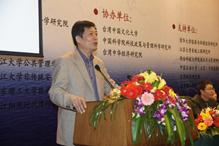 |
| Prof. Yu Xiaofeng, Director of NTS-PD, presenting at the 4th Cross-Straits Energy Economics Conference. |
The 4th Cross-Straits Energy Economics Conference was hold at Zhejiang University on 21–23 October 2011, with the theme ‘Population Urbanisation and Transformation of Low-Carbon Society’. It was co-hosted by the Social Science Institute, College of Public Administration and the NTS-PD of Zhejiang University; Beijing Institute of Technology; and Zhejiang Sunshinelaw Firm. The event was co-sponsored by the Taiwan Chinese Culture University, Chinese Academy and Chung Hua Institution for Economic Research Taiwan WTO Center. Over 70 representatives from Taiwan participated in this conference, communicating ideas about energy, economics, society, environment and climate change.
National Dialogue on ‘Victims of Socio-economic Injustice in Democratic India’
Centre for the Study of Developing Societies (CSDS)
1–2 October 2011
Bangalore, India
CSDS-Lokniti organised a National Dialogue on the ‘Victims of Socio-economic Injustice in Democratic India’ on 1–2 October 2011 at the United Theological College in Bangalore. This dialogue is part of a series of dialogues organised by CSDS-Lokniti under the Project ‘Global Conversation on Democracy’. About 25 academics, activists and other concerned citizens from the different regions of India participated in the dialogue to share their views on why socio-economic justice and the right to live with dignity continues to be a distant dream for hundreds of millions of Indian citizens. The main focus of the dialogue was to understand the mechanism that allows mass poverty, hunger, disease and lack of education to co-exist with a functioning electoral democracy. Aspects of democratic politics (party organisations, elections, legislatures, etc.) and sections of society (e.g., agricultural workers, and minorities such as the dalit and adivasis) were discussed in search for answers to why the system has failed for the overwhelming majority of the poor and the deprived. The dialogue was coordinated by Mr Jasvir Singh. Prof. Yogendra Yadav and Ms Kinjal Sampat from CSDS-Lokniti participated in the dialogue.
Seminar on ‘Sri Lanka: Post-Conflict Rebuilding of Society’
Regional Centre for Strategic Studies (RCSS)
27–28 September 2011
Colombo, Sri Lanka
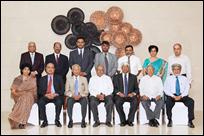 RCSS in collaboration with the Centre for Security Analysis (CSA) organised a Seminar titled ‘Sri Lanka: Post-Conflict Rebuilding of Society’ on 27–28 September 2011 at the Cinnamon Lakeside hotel. The seminar was the third in a series of yearly joint conferences on the theme of Sri Lanka’s conflict, organised by the CSA and RCSS since 2009.
RCSS in collaboration with the Centre for Security Analysis (CSA) organised a Seminar titled ‘Sri Lanka: Post-Conflict Rebuilding of Society’ on 27–28 September 2011 at the Cinnamon Lakeside hotel. The seminar was the third in a series of yearly joint conferences on the theme of Sri Lanka’s conflict, organised by the CSA and RCSS since 2009.
The two-day conference bought together a number of distinguished academics, senior civil servants and diplomats from India and Sri Lanka. The seminar focused on current challenges encountered in the post-conflict rebuilding process, such as the socioeconomic challenges, the challenges of harmonising ethnic diversity and the political challenges encountered in the rebuilding process with respect to the above-mentioned themes.
Prof. Tissa Vitarana, Senior Minister for Science and Technology, was the Chief Guest at the event. Prof. Vitarana in his keynote address emphasised the need for all communities to work out a rational set of actions in a friendly manner without any hostility, if the country is to reap the full benefits of defeating terrorism. Among the other distinguished speakers at the event were Prof. Rajiva Wijesinha, Member of Parliament and Advisor to the President on reconciliation; Mr S.B. Divaratne, Secretary, Presidential Task Force for Resettlement, Development and Security in the Northern Province; Amb. G. Parthasarathy, a former Indian Diplomat; Dr N. Manoharan, Senior Fellow, Centre for Land and Warfare Studies, New Delhi; Mr N. Selvakumaran, Dean, Faculty of Law, University of Colombo; and Dr Saman Kelegama, Executive Director, Institute of Policy Studies.
The event was attended by distinguished academics, members of the diplomatic community and civil society members.
Roundtable on ‘Women, Peace and Disarmament’
21 September 2011
Women in Security, Conflict Management and Peace (WISCOMP)
New Delhi, India
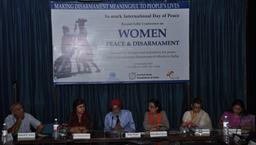 In September 2011, WISCOMP in partnership with Control Arms Foundation of India (CAFI) and United Nations Information Centre (UNIC) organised a Roundtable in New Delhi on ‘Women, Peace and Disarmament’. It provided a platform to some 60 academics, students and civil society activists from various parts of India for shared reflections on the challenges and potential of women’s involvement in peace and disarmament efforts. In September 2011, WISCOMP in partnership with Control Arms Foundation of India (CAFI) and United Nations Information Centre (UNIC) organised a Roundtable in New Delhi on ‘Women, Peace and Disarmament’. It provided a platform to some 60 academics, students and civil society activists from various parts of India for shared reflections on the challenges and potential of women’s involvement in peace and disarmament efforts.
The panel discussions foregrounded the history of disarmament in independent India, specifically explored disarmament efforts by women in India and looked at possible alliances for peace and India’s leadership in disarmament efforts. Amidst an environment of growing militarisation and arms proliferation, the roundtable sought to contribute to an alternative and gender-sensitive discourse on peace and disarmament in India.
Speakers at the conference included Air Commodore (Retd) Jasjit Singh (Director, Centre for Air Power Studies), Prof. Anuradha Chenoy (School of International Studies, Jawaharlal Nehru University), Ms Kiran Mehra-Kerpelman, (Director, UN Information Centre for India and Bhutan), Ms Binalakshmi Nepram, (Secretary-General, CAFI), Prof. Susheela Bhan (Director, The Institute of Peace Research and Action), Mr Ravinder Pal Singh (Defence Analyst and Former Project Leader on Arms Procurement, Stockholm International Peace Research Institute), Dr Tasneem Meenai (Director, Nelson Mandela Centre for Peace & Conflict Resolution, Jamia Millia Islamia), and representatives from groups such as the Manipur Women Gun Survivors Network (MWGSN).
The Geopolitics of Emerging Geoengineering Technologies
29 September 2011
RSIS Centre for Non-Traditional Security (NTS) Studies
Singapore
 As solar geoengineering research expands, so too will the geopolitical implications. Actions now being taken or encouraged by a small number of scientific and policy entrepreneurs largely independent of the national governments are driving both the technological and political dimensions of policy and public discussions, and thus shaping how solar geoengineering technologies might evolve to influence our future climate. This talk by Dr Jason Blackstock, Senior Fellow for Energy and the Environment, The Centre for International Governance Innovation (CIGI), Canada; and Research Scholar, International Institute for Applied Systems Analysis (IIASA), explored the recent and potential future evolution of the global solar geoengineering discourse through: (a) identifying distinct groups of scientific and policy entrepreneurs recently and currently involved; (b) exploring the range of national and international ‘issue areas’ that are currently or might soon be implicated in the geoengineering discourse; and (c) analysing specific international institutions and treaties that are currently or might be engaged through the ‘forum shopping’ activities of existing or potential new geoengineering policy entrepreneurs. Particular attention was paid to transnational (geopolitical) dynamics and uncertainty about the future evolution of solar geoengineering technologies. As solar geoengineering research expands, so too will the geopolitical implications. Actions now being taken or encouraged by a small number of scientific and policy entrepreneurs largely independent of the national governments are driving both the technological and political dimensions of policy and public discussions, and thus shaping how solar geoengineering technologies might evolve to influence our future climate. This talk by Dr Jason Blackstock, Senior Fellow for Energy and the Environment, The Centre for International Governance Innovation (CIGI), Canada; and Research Scholar, International Institute for Applied Systems Analysis (IIASA), explored the recent and potential future evolution of the global solar geoengineering discourse through: (a) identifying distinct groups of scientific and policy entrepreneurs recently and currently involved; (b) exploring the range of national and international ‘issue areas’ that are currently or might soon be implicated in the geoengineering discourse; and (c) analysing specific international institutions and treaties that are currently or might be engaged through the ‘forum shopping’ activities of existing or potential new geoengineering policy entrepreneurs. Particular attention was paid to transnational (geopolitical) dynamics and uncertainty about the future evolution of solar geoengineering technologies.
Click here to listen to the seminar.
1st Cross-Straits Conference on ‘Rural Social Pension Insurance’
8–9 September 2011
Centre for Non-Traditional Security and Peace Development Studies (NTS-PD)
Zhejiang, China
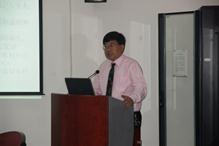 |
| Prof. Hong Mi, Deputy Director of NTS-PD, speaking at the conference. |
The 1st Cross-Straits Conference on ‘Rural Social Pension Insurance’ was hold in Zhejiang University on 8–9 September 2011. It was co-hosted by China Social Countryside Insurance Management Association, College of Public Administration of Zhejiang University and Taiwan National Chung Cheng University. Participants from China, Taiwan and other countries discussed and communicated different ideas and perspectives about the issues of rural social pension insurance, such as developmental systems and institutions, and also presented comparison studies about the aging service industry in China and Taiwan.
^ To the top
Recent Publications
Global Governance, HIV/AIDS and the MDGs: Where Are We Now and What Lessons Have Been Learnt for the Future?
Institute for Human Security (IHS), La Trobe University
 Katharine Hagerman and Alan Whiteside, ACFID Research and Development Series Report, No. 5, October 2011. Katharine Hagerman and Alan Whiteside, ACFID Research and Development Series Report, No. 5, October 2011.
Since their adoption by the UN General Assembly in September 2000, the Millennium Development Goals (MDGs) have had an unprecedented impact on the global development arena. However, the MDGs will not be met in parts of Sub-Saharan Africa, largely due to the devastating impacts of the AIDS epidemic on the economic progress and social conditions of the region. In this paper, the reasons for why this is happening are explored. Examples from three of the MDGs were also highlighted; they were selected with the understanding that their interconnection means that the failure to achieve one limits progress in the others. The report then goes on to argue for an exceptional response to the AIDS epidemic in Sub-Saharan Africa. It also explores the limitations of the global HIV/AIDS response to date, which has focused heavily on technical and individual behavioural interventions without addressing the underlying drivers of the epidemic. Changes in two main aspects of the global response to AIDS were advocated: first, for a reorientation in the prevention response to empower communities and local governments to design and implement contextually appropriate and multi-sectoral interventions; second, for a transformation of global health governance so that at the macro level it can embody the principles of equity and self-determination. |
|
Alternatives to Debtors Prison: Developing a Framework for International Insolvency
Institute for Human Security (IHS), La Trobe University
 Luke Fletcher and Adelle Webb, ACFID Research and Development Series Report, No. 4, October 2011. Luke Fletcher and Adelle Webb, ACFID Research and Development Series Report, No. 4, October 2011.
A business is insolvent when it cannot pay off its debts. So what is international insolvency? How do countries go broke? Why does it keep happening? Who should bear the cost? The sovereign debt crises in Greece, Spain and Ireland have emphasised the urgency of the issue, but the phenomenon of countries repeatedly going broke (i.e., unable to meet their financial obligations) has a long history. This paper aims to answer the questions above by examining this history and the key patterns that have emerged. This policy paper was inspired by ‘The Bankruptcy of Nations: An Idea Whose Time Has Come’, an article by Professor Ross Buckley in the Fall 2009 edition of The International Lawyer. |
|
Religion and Development: Australian Faith-Based Development Organisations
Institute for Human Security (IHS), La Trobe University
 Gerhard Hoffstaedter, ACFID Research and Development Series Report, No. 3, October 2011. Gerhard Hoffstaedter, ACFID Research and Development Series Report, No. 3, October 2011.
Faith plays a crucial role in development, yet ‘faith-based’ organisations (FBOs) continue to face ambivalence towards their religiosity and how it may impact upon the development work they do. As a result they have undergone structural changes to ameliorate the pressures arising from mainly government-related outcome-oriented funding structures. This also relates to the dual role FBO legitimacy plays in ensuring both public donations at home and successful outcomes in the recipient country. FBOs have significant advantages over secular organisations in their ability to harness moral will at home and abroad as well as tap into transnational religious networks and local communities in aid recipient countries. Australian FBOs involved in international development are a diverse and under-researched category that is difficult to define. This paper seeks to study this group of organisations to better understand them and their missions, the challenges they pose to development and the challenges they face in development. |
|
Closing the Gender Gap: Gender and Australian NGOs
Institute for Human Security (IHS), La Trobe University
 Patrick Kilby and Joanne Crawford, ACFID Research and Development Series Report, No. 2, October 2011. Patrick Kilby and Joanne Crawford, ACFID Research and Development Series Report, No. 2, October 2011.
This research report seeks to fill a gap in the publicly available evidence regarding factors influencing gender integration in Australian non-governmental organisations (NGOs), and to use this to shape recommendations about the development of gender capacity in the Australian NGO sector, with the aim of accelerating progress towards gender equality. It presents research undertaken between August 2010 and February 2011 with a sample of 15 Australian NGOs, together with a comparative literature study of the integration of gender by other international organisations and NGOs. The report begins with an outline of the rationale for the research. It then examines the literature on gender and gender mainstreaming with a focus on the experiences of two multilateral agencies, United Nations High Commissioner for Refugees (UNHCR) and United Nations Development Programme (UNDP); two bilateral agencies, the Australian Agency for International Development (AusAID) and the Department For International Development (DFID); and the experiences of NGOs in other countries, particularly developing countries. The third part of the report looks at the experiences of Australian NGOs and proposes ways forward. |
|
Virtual Water: Tackling the Threat to Our Planet’s Most Precious Resource
 J. Jackson Ewing, Water International, Vol. 36, No. 7, 2011. J. Jackson Ewing, Water International, Vol. 36, No. 7, 2011.
The foundational theses of Virtual Water may be summarised as the notion that water is embedded in a range of products that we consume, that its presence often remains hidden, and that the trade of water-intensive goods is tantamount to the trade of water resources. Food is by far the most significant water-intensive commodity, and agriculture is therefore ubiquitous to all of the major arguments in Virtual Water. |
|
Feeding Asia in the 21st Century: Building Urban–Rural Alliances
RSIS Centre for Non-Traditional Security (NTS) Studies
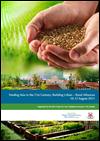 Conference Report, November 2011. Conference Report, November 2011.
Organised by the RSIS Centre for NTS Studies and the Southeast Asian Regional Center for Graduate Study and Research in Agriculture (SEARCA), the International Conference on Asian Food Security (ICAFS) took place on 10–12 August 2011 at the Grand Copthorne Waterfront Hotel in Singapore. ICAFS 2011, themed ‘Feeding Asia in the 21st Century: Building Urban-Rural Alliances’, was convened in the context of complex and multifaceted challenges throughout food systems in Asia. The conference sought to address timely questions relating to these challenges, and foster discussions among a range of stakeholders from Asia’s food sectors.
This report details the proceedings of the three-day conference. It also contains an ICAFS Statement put forth by participants on ways forward to address food security in Asia. |
|
Pilot Workshop on Governing Geoengineering in the 21st Century: Asian Perspectives
RSIS Centre for Non-Traditional Security (NTS) Studies
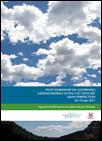 Conference Report, November 2011. Conference Report, November 2011.
Geoengineering is receiving growing global attention with the slow progress of international negotiations to reduce greenhouse gas emissions. However, the emergence of geoengineering technologies, as a new potential response for ameliorating the risks of climate change, appears to have given rise to at least as many challenges as it might have answered. Research and discussion on geoengineering have mostly been driven by European and North American countries while other regions that are significantly affected by climate change, such as Asia and the Pacific, are yet to make their perspectives heard.
Against this backdrop, the Pilot Workshop on ‘Governing Geoengineering in the 21st Century’, organised by the Centre for NTS Studies on 18–19 July 2011, was the first meeting in the Asia-Pacific region to elicit Asian perspectives in the geoengineering discourse. The event explored how geoengineering was perceived and framed in Asia-Pacific countries in relation to climate change mitigation and adaptation. It examined the threats ahead of and opportunities in store for geoengineering as a new set of emerging technologies with which to address climate change and the pressing demands for a low-carbon economy. |
|
Study Group on Climate Change, Migration and Human Security in Southeast Asia
RSIS Centre for Non-Traditional Security (NTS) Studies
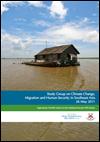 Conference Report, October 2011. Conference Report, October 2011.
The RSIS Centre for NTS Studies organised a study-group meeting to address the topic of ‘Climate Change, Migration and Human Security in Southeast Asia’ on 26 May 2011 in Singapore. The project was funded by the MacArthur Foundation’s Asia Security Initiative and represented perhaps the first efforts in Singapore to discuss the nexus of climate change and migration in an in-depth regional context. The purpose of this meeting was to examine the nature of possible climate-induced migration in the region; to consider the ways in which such migratory patterns could be framed as security issues; to critically assess what conceptions of security are most germane to the connections between climate change and migration; and to investigate how security consequences, particularly from human security perspectives, can be managed. |
|
Feeding Southeast Asia in the 21st Century
RSIS Centre for Non-Traditional Security (NTS) Studies
 Sally Trethewie, NTS Policy Brief, No. 14, November 2011. Sally Trethewie, NTS Policy Brief, No. 14, November 2011.
Southeast Asia’s food security challenges are multifaceted and complex, with an estimated 14 per cent of the population suffering undernourishment. The recent International Conference on Asian Food Security (ICAFS), held in Singapore in August 2011, addressed the challenge of feeding the region in the coming decades in the context of significant anticipated environmental, economic and demographic changes. This policy brief highlights three key issues that emerged from the ICAFS 2011 discussions, namely, the impact of volatile food prices, the challenges facing small-holder farmers and securing food for urban populations. |
|
Climate Change, Migration and Human Security in Southeast Asia
RSIS Centre for Non-Traditional Security (NTS) Studies
 Lorraine Elliott, NTS Policy Brief, No. 13, October 2011. Lorraine Elliott, NTS Policy Brief, No. 13, October 2011.
Migration and displacement are among the range of pressures on people and their communities likely to arise from the economic, social and environmental consequences of climate change. Despite fragmented data, the climate security literature has focused on the potential for climate change-induced migration to trigger social tensions and conflict within states and across borders. A human security approach seeks to ensure that people are placed at the centre of concerns about mobility and migration in response to climate change. This requires more than identifying those who are vulnerable to migration pressures. It necessitates an understanding of how mobility choices are made and how vulnerabilities can be managed in ways that are participatory and responsive to local needs and circumstances. |
|
The Bangkok Floods – Reflections on the Waters
RSIS Centre for Non-Traditional Security (NTS) Studies
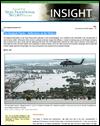 R.D. Hill, NTS Insight, November 2011. R.D. Hill, NTS Insight, November 2011.
The lingering flood-waters on the Chao Phraya plain, especially in and around Bangkok, are a reminder of the vulnerability of all low-lying cities in Asia to heavy rainfall. While parts of the city have continued to function, though with difficulty, a number of outlying areas are still flooded and barely able to function more than a month after the beginning of the flood. This NTS Insight briefly examines the likely costs of the flood. It then reflects on what might have been had water depths been comparable to historical floods, and on the major technical and economic challenges that lie ahead with climate change expected to bring higher sea levels and possibly more frequent and even greater flooding. |
|
On the Fast Train to Nuclear Disaster? Bias and Phobia as Challenges to China’s Pursuit of Nuclear Energy
RSIS Centre for Non-Traditional Security (NTS) Studies
 Zbigniew Dumienski, NTS Alert, Issue 2, November 2011. Zbigniew Dumienski, NTS Alert, Issue 2, November 2011.
In 2011, China’s nuclear power ambitions were shaken, first by the Fukushima disaster which undermined public trust in nuclear energy worldwide, then by the spectacular crash of China’s flagship transportation project – the high-speed rail. This issue of the NTS Alert looks critically at the negative comments in the media, and in academic publications, on China’s development and its nuclear energy programme, and offers a wider and more optimistic perspective on both China’s progress and the safety of nuclear energy. |
|
Falling from Grace: Nuclear Energy in Japan Post-Fukushima
RSIS Centre for Non-Traditional Security (NTS) Studies
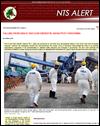 Sofiah Jamil, NTS Alert, Issue 1, November 2011. Sofiah Jamil, NTS Alert, Issue 1, November 2011.
Prior to the triple disaster of March 2011, Japan was perceived as one of the more well-prepared nations in the world in the area of disaster response. However, the earthquake, tsunami and most particularly the nuclear crisis in Fukushima demonstrated the limits of any disaster preparedness programme if not complemented by sufficient safety measures and foresight in governance. This NTS Alert examines the importance of effective nuclear energy governance systems by highlighting the implications for Japan’s future and that of the East Asian region. |
|
Exercising the Responsibility to Assist: The Roles of the International Community and Cambodian Civil Society
RSIS Centre for Non-Traditional Security (NTS) Studies
 Alistair D.B. Cook, Lina Gong and Manpavan Kaur, NTS Alert, Issue 2, October 2011. Alistair D.B. Cook, Lina Gong and Manpavan Kaur, NTS Alert, Issue 2, October 2011.
This Alert examines the role of intergovernmental and non-governmental stakeholders in promoting human security in Cambodia through transitional justice. It maps out the relations between and among the different actors and how these relations have affected and will continue to affect the realisation of human security in Cambodia. In particular, it discusses the potential impacts of the recent draft Law on Associations and Non-governmental Organisations (NGO Law) on the ability of non-governmental organisations (NGOs) to empower people in Cambodia. It argues that it is crucial for the Cambodian government to work closely with other actors in its rebuilding effort. Through cooperation and coordination with the government, NGOs and civil society actors can keep all stakeholders better informed and enabled to exercise the Responsibility to Protect (RtoP), thus ensuring human security in Cambodia. |
|
Peacebuilding Governance – Negotiating the Khmer Rouge Trials
RSIS Centre for Non-Traditional Security (NTS) Studies
 Lina Gong and Manpavan Kaur, NTS Alert, Issue 1, October 2011. Lina Gong and Manpavan Kaur, NTS Alert, Issue 1, October 2011.
The domestic policies of the Khmer Rouge regime resulted in widespread human insecurity. The pursuit of justice against past atrocity crimes through the Extraordinary Chambers in the Courts of Cambodia (ECCC) trials represents an essential step in Cambodia’s rebuilding process as well as a key tool for the state to fulfil its responsibility to protect its citizens from mass atrocities. This NTS Alert examines the role of the Cambodian government in redressing past gross human rights abuses. |
|
Improving Aquaculture in Post-tsunami Aceh, Indonesia: Experiences and Lessons in Better Management and Farmer Organizations
 Panemangalore Arun Padiyar, Michael John Phillips, Bangarusamy Ravikumar et al., October 2011. Panemangalore Arun Padiyar, Michael John Phillips, Bangarusamy Ravikumar et al., October 2011.
Coastal aquaculture in Aceh was severely affected by the Asian Tsunami in December 2004. Capacity building among stakeholders was one of the key activities implemented by various agencies during the post-tsunami aquaculture rehabilitation and subsequent development phase. The main objective was improving production efficiencies and farmer incomes. This article describes the process of implementation of the approach and crop outcomes until the end of 2009. |
|
Certifying Catfish in Vietnam and Bangladesh: Who Will Make the Grade and Will It Matter?
 Ben Belton, Mohammad Mahfujul Haque, David C. Little et al., Food Policy, Vol. 36, No. 2, April 2011. Ben Belton, Mohammad Mahfujul Haque, David C. Little et al., Food Policy, Vol. 36, No. 2, April 2011.
Certification is an increasingly pervasive form of market governance through which retailers and NGOs are able to exert control over producers of primary products in order to secure their commercial and institutional interests. This paper assesses the likely outcomes of emerging certification standards intended to govern production of a new global commodity, Pangasius catfish. This evaluation focuses on Pangasius producers in Vietnam and Bangladesh, and one of the key areas which standards seek to regulate – the environment. The article concludes that certification is likely to result in greater differentiation and polarisation between larger and smaller farm operators and will increasingly act to exclude the latter from access to Western European and North American markets, and that any local environmental gains produced may be of relatively minor significance. |
|
Aquaculture in the ASEAN Region
The WorldFish Center
 Policy Brief, No. 29, 2011. Policy Brief, No. 29, 2011.
This global review of aquaculture aims to inform policymakers about the impacts of aquaculture on the environment and to stimulate debate on the optimal animal food production systems for tomorrow. The ASEAN region is, from supply and demand perspectives, an important centre for aquaculture. This short brief highlights some of the key study findings that are relevant to the ASEAN region. |
|
Aquaculture Helping to Improve Health and Nutrition in Bangladesh
The WorldFish Center
 Project Flyer, No. 62, 2011. Project Flyer, No. 62, 2011.
Save the Children is managing a five-year, USAID-funded food security programme entitled Nobo Jibon Multi-Year Assistance Program (MYAP) in the coastal zone of the Barisal Division, one of Bangladesh’s most poverty stricken and disaster-prone areas. The programme comprises three strategic objectives that relate to mother and child health and nutrition, market-based food production and income generation, and disaster risk reduction and emergency preparedness. The WorldFish Center work will help build capacity in Save the Children and the project’s implementing partner NGOs through training and the transfer of technology for the successful operation of small-scale homestead aquaculture farming to help improve mother and child health and nutrition. |
|
Small Fish Can Mean Big Nutrition
The WorldFish Center
 Project Flyer, No. 61, 2011. Project Flyer, No. 61, 2011.
Malnutrition levels in Bangladesh are amongst the highest in the world. Approximately half of Bangladesh’s population lives below the food poverty line and the dietary intake of both adults and children are severely deficient in key vitamins and minerals. It is now understood that women and children are the more food-insecure and micronutrient-deficient in the population. This project, supported by the International Fund for Agricultural Development (IFAD), aims to increase household income in poor, rural households in Bangladesh, and improve nutrition, especially in women and children, through increased intake of nutrient-rich small fish. This project promotes innovative new technologies designed to increase the production of small nutrient-rich fish species in two separate and environmentally distinct agricultural areas. The project targets approximately 1,500 households with small fish ponds in the northwest districts of Rangpur and Dinajpur, and approximately 500 households in the northeast district of Sunamganj, an area dominated by wetlands and an open water capture fishery. |
^ To the top
Commentaries and Other News Articles
The 19th ASEAN Summit: Tackling Floods, Food and Stability
Yang Razali Kassim, RSIS Commentaries, No. 166, 14 November 2011
Thailand’s Floods: Political and Security Impact
Antonio L. Rappa, RSIS Commentaries, No. 161, 8 November 2011
EAS and Non-Traditional Security: How about Health and Food Concerns?
Ong Suan Ee, RSIS Commentaries, No. 158, 4 November 2011
Excluded: The Forgotten Women of War and Peace
Jasmine-Kim Westendorf, The Conversation, 2 November 2011
Religion and Development: Unanswered Questions
Gerhard Hoffstaedter, Development Policy Blog, 31 October 2011
Pakistan, India and Kashmir: Will Nature Force an Aceh Effect?
Rajesh Basrur and Yang Razali Kassim, RSIS Commentaries, No. 151, 18 October 2011
Floods and Regional Disaster Preparedness: Too Little, Too Late?
Mely Caballero-Anthony and Sofiah Jamil, RSIS Commentaries, No. 150, 17 October 2011
(also published in Phnom Penh Post, Eurasia Review and ReliefWeb)
China and Its Southern Neighbours: Issues in Power Connectivity
Zha Daojiong, RSIS Commentaries, No. 147, 14 October 2011
China's High Speed Rail System: Impact on Food Security
Zhang Hongzhou and Zhang Mingliang, RSIS Commentaries, No. 146, 13 October 2011
An Arab Development Bank: Institutionalising Change in Middle East
James M. Dorsey, RSIS Commentaries, No. 145, 10 October 2011
Responsibility to Protect: Tensions between Sovereignty and Security
Barry Desker and Joel Ng, RSIS Commentaries, No. 142, 6 October 2011
Food Fears
Paul Teng, theSun, 4 October 2011
^ To the top
|